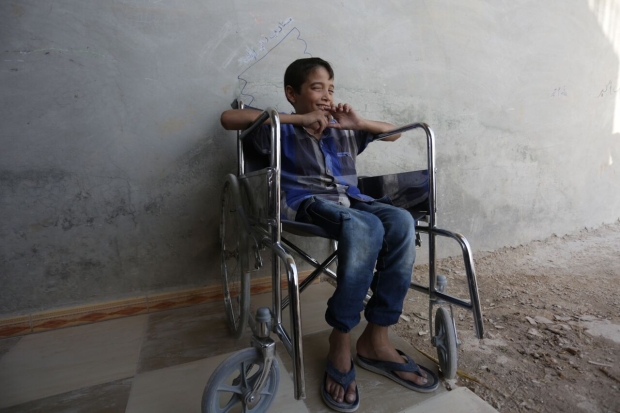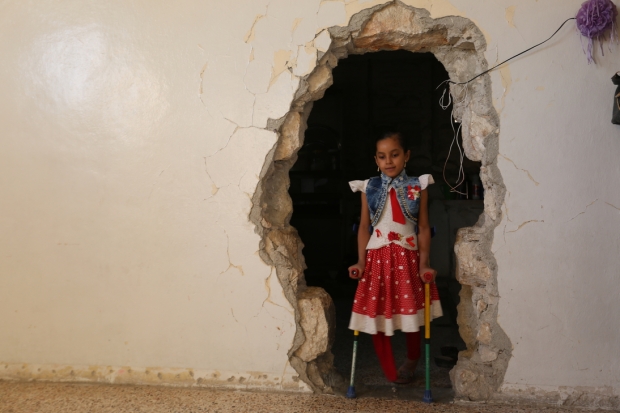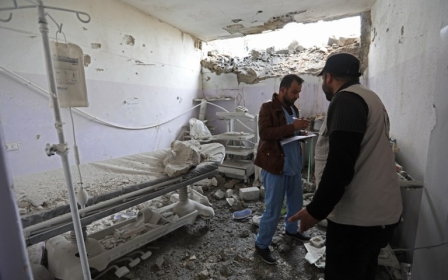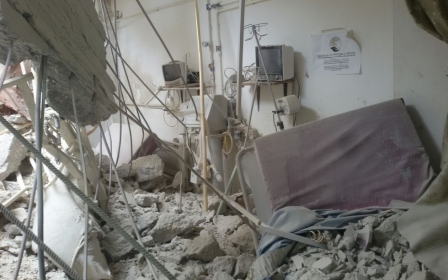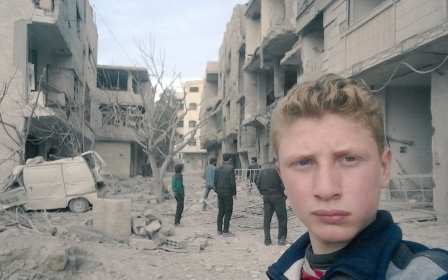'No choice': Syrians travel from one rebel area to another to find medicine

When the bombs rained down on Douma city, the Araba family stayed put. But when food shortages and a lack of medicine in the area began to affect the children, Joumana Araba had no choice but to take her family out of Eastern Ghouta.
"Amena and Yasin just laid there. They were too weak to move and unable to eat anything," Araba told Middle East Eye from a refugee camp in northern Syria.
"I thought my children were going to die in East Ghouta. Not from the bombs, but the lack of food and medicine."
Amena, 13, and Yasin, 16, both suffer from a genetic disorder called thalassemia which affects the blood. Sufferers of the disease can face severe complications if left without medical attention.
Under normal circumstances, the disease is manageable. But after years of living under siege in Eastern Ghouta, the inability to find food and medicine has crippled the children.
New MEE newsletter: Jerusalem Dispatch
Sign up to get the latest insights and analysis on Israel-Palestine, alongside Turkey Unpacked and other MEE newsletters
"When things got bad for the children, we had no choice but to put them on wheelchairs and leave," said Araba.
Her family has since moved three times to different rebel-held areas scattered across Syria in the hope of finding medicine.
The Araba family's case offers a glimpse into the life of hundreds of Syrians who have been forced to leave their homes and move from one rebel area to another across Idlib in search of medical treatment for their chronic illnesses.
Continued air strikes on Idlib has meant that more than one million people are now displaced from their homes in Syria.
The UN in a desperate plea for a ceasefire in January said it could "no longer stay silent" as air strikes continued to pound northern Syria.
But amidst the continued bombardment, hospitals that serve thousands across rebel-held areas in northern Syrian and Eastern Ghouta have repeatedly been targeted in the recent escalation.
Over the last two weeks, seven medical facilities in Idlib were targeted by air strikes, with a hospital in Kafranbel that had an intensive care unit destroyed by suspected Russian air strikes.
Destruction of hospitals
The bombing of hospitals has meant the air strikes destroyed equipment and stockpiles of medicine needed to help the thousands who suffer from chronic illnesses like diabetes and other conditions.
"The constant bombardment of opposition areas has given medics no choice but to prioritise emergency trauma care," Dr Hatem from the Independent Doctor's Association told Middle East Eye.
"This has sadly come at the expense of patients who need help with chronic or long-term conditions like thalassemia or diabetes."
Compounded with years of civil war, Syria has endured a brain-drain that has meant hundreds of doctors in specific fields had fled rebel-held areas.
Constant targeting of hospitals in rebel areas is ultimately a tactic ... used by Assad
- Anonymous aid worker
It has meant that many people have been unable to find the medical care they need inside Syria.
The repeated targeting of hospitals has also meant international NGOs have become reluctant to support new clinics in northern Syria.
Activists and aid workers who spoke to MEE on the condition of anonymity said that many NGOs had become "hesitant" to fund new medical facilities inside Syria.
"Many NGOs are reluctant to fund hospitals or medical facilities in Idlib as they know warplanes from the regime and Russia will target them," the anonymous aid worker told MEE.
"The constant targeting of hospitals in rebel areas is ultimately a tactic Assad used in Aleppo, and is using again, in the hope of pushing civilians into regime areas."
Flee to Turkey
Many Syrians who have family members with chronic illnesses have attempted to flee to Turkey where they hoped to receive the medical care they needed.
But due to continued restrictions, referrals are often given to patients who need immediate evacuation and in a critical condition.
Nine-year-old Fatima Hussein, who lost her leg after a barrel bomb hit her home in east Aleppo, said that going to Turkey "would be a dream."
Like the Araba family, Fatima has moved several times with her mother and sister in search of medical care.
She was unable to receive medical attention after her home in East Aleppo was hit by a barrel bomb. It later led to her leg becoming infected and subsequently amputated by doctors.
Her mother, Marwa Hussein, said that the bombing campaign in Idlib had made many injured civilians too afraid to visit their local hospitals.
"Some patients would have had a better chance of survival in their homes than the hospitals, " Marwa told MEE.
"After Assad would bomb a hospital, the nearest one would be miles away in another town."
She added: "We tried to get help in nearly every hospital in northern Syria, in the hope of getting Fatima a prosthetic leg. But no one has been able to help.
"We have no money to pay someone to smuggle us into Turkey. I just want Fatima to get help so she can have a chance of living a healthy life filled with joy and laughter."
'Whatever it takes'
Despite the challenging search for medicine, Joumana is relieved to have left Eastern Ghouta after enduring years of living under siege.
Looking at her children, who are now able to play in the Idlib countryside, she said: "We were all on the edge of death during our time in the siege.
"But now Amena and Yasin can play a little and have a chance of living a better life.
"We still need medicine, but for now, we managed to leave the most intense war in East Ghouta, to the less intense one in Idlib."
Middle East Eye delivers independent and unrivalled coverage and analysis of the Middle East, North Africa and beyond. To learn more about republishing this content and the associated fees, please fill out this form. More about MEE can be found here.


